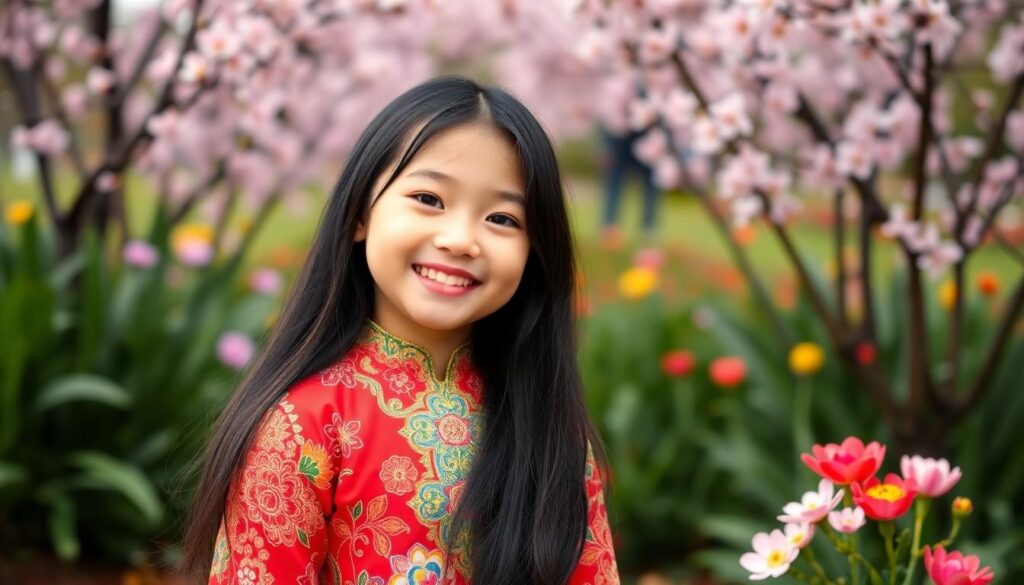Choosing the perfect name for a baby girl is an exciting journey and we all want something that feels special. Asian names for girls offer a beautiful blend of meaning, elegance and cultural depth that make them truly unforgettable. Whether we’re drawn to graceful sounds or rich stories behind each name these options stand out with their unique charm.
We know how important it is to find a name that feels just right. With so many stunning choices from across Asia there’s a industry of inspiration waiting for us. Let’s explore how these names can bring beauty and significance to our little one’s life.
Exploring The Beauty Of Asian Names For Girls
Let’s look closely at how Asian names for girls carry rich stories and elegance. Cultures throughout Asia create meaningful choices—names like Hana from Japan mean flower, while Jia from China represents beauty. Each origin brings its own tradition and symbolism, so we find endless inspiration whether we’re exploring Indian, Vietnamese, or Korean names.
Discovering these names usually starts with their origins and meanings. For example, we see Japanese names often highlight nature or virtues, such as Yuna (gentle) or Sakura (cherry blossom). Indian names like Priya (beloved) and Anika (grace) draw from Sanskrit roots giving depth and spiritual value. Some of us choose names based on positive qualities in Chinese culture, picking options like Mei (beautiful) or Xiu (elegant).
Many of us appreciate short, melodious names for their grace and convenience. Looking at Korean choices, Minji (intelligent) and Sora (sky) are simple yet carry important meaning. These names don’t just sound lovely—they reflect cultural pride.
We often match a name’s sound with how it feels to say. Names such as Amara from Southeast Asia and Kim from Vietnam are easy to pronounce and adapt well across cultures. Families today love picking names that honor both heritage and modern appeal.
We celebrate these names not just for their beauty but for how they connect generations. Sharing stories about why a name was chosen—maybe after a grandmother or inspired by a legend—adds even more significance. The beauty of Asian names for girls really shines when we see how they blend individuality, tradition, and a sense of belonging.
Celebrating Traditional Asian Names For Girls

When we look at traditional Asian names for girls, we discover a industry of stories and values beautifully woven into every syllable. Each culture offers its own treasures, shaped by philosophy, nature, and family bonds.
Embracing Ancient Chinese Girl Names
Confucian values shape names like 智慧 (Zhì Huì) for “Wisdom” and 德馨 (Dé Xīn) for “Virtuous Fragrance,” giving us a glimpse into core beliefs like honesty and trustworthiness with 诚信 (Chéng Xìn). Taoist concepts also come alive in names such as 自然 (Zì Rán) meaning “Natural” and 和谐 (Hé Xié) for “Harmony,” each name vibrantly reflecting Chinese philosophy. Using nature and virtues, names like 丽华 (Lihua) for “Beautiful and Splendid,” 小雨 (Xiaoyu) for “Little Rain,” and 雪琴 (Xueqin) for “Beautiful Lotus” carry elegance and depth across generations.
Honoring Timeless Japanese Girl Names
Many Japanese girl names create vivid images inspired by nature, with Sakura (桜) meaning “Cherry Blossom” and Yumi (弓) for “Bow” or “Archery” instantly standing out. Some parents favor virtues, choosing names like Akira (明) for “Bright” or “Clear” and Emiko (恵美子) for “Blessed Child” to reflect positive qualities. Kanji characters allow each name to express unique beauty and cultural significance, offering endless ways for families to tell their story.
Discovering Classic Korean Girl Names
Simplicity marks many Korean names for girls, often using a single syllable like Ji (지) or Min (민). Favorites such as Hana (하나) mean “One” or “Unity,” while Jina (지나) means “Talented and Beautiful,” making these choices both meaningful and melodic. In every name, we often find connections to our family’s roots and heritage, showing how tradition shapes identity.
Appreciating Traditional Indian Girl Names
Tradition in India means girl names draw from a mosaic of languages, with Sanskrit origins appearing in options like Aaradhya (आराध्या) meaning “Worship” and Ananya (अनन्या) for “Unique.” Many names honor nature or goddesses — think Nalini (नालिनी) meaning “Lotus” or Lakshmi (लक्ष्मी) after the goddess of prosperity. Across regions, these names sound distinct while always resonating with deep history and family connection.
Choosing Meaningful Modern Asian Names For Girls

We see a growing trend toward Asian names that blend beauty, tradition, and modern style. Many parents look for names that stand out but still carry rich cultural stories.
Trending Southeast Asian Girl Names
Plenty of Southeast Asian girl names now gain popularity for their unique sound and deep meaning. Vietnamese favorites like Linh, meaning “spirit,” and Ngoc, meaning “jewel,” highlight strength and delicacy. Thai names attract us with options such as Pim for “diamond” and Namfon for “rain,” combining elegance with nature. Filipino choices often draw from both Spanish and indigenous roots—names like Maya (“illusion”) and Luna (“moon”) feel vibrant and current. Zara, meaning “blooming flower,” continues to rise among Filipino families seeking something fresh but meaningful.
Popular Unisex Names Among Asian Girls
Asian cultures offer fantastic unisex options that appeal to diverse families. We often hear about Jiang (“river”) and Lei (“bud”) in Chinese communities, flexible enough for any child. Japanese favorites like Akira, which means “bright,” and Sora, meaning “sky,” cross traditional gender lines to suit both boys and girls. In Korea, Min-ju, which means “intelligent and talented,” is most common for girls but sometimes chosen for boys, opening up more possibilities for personal expression.
Unique Modern Interpretations Of Asian Names For Girls
Recently, parents embrace creative combinations for a new take on tradition. Blending characters is common in China, where Xinlei (“heart bud”) weaves together warmth and growth from older roots. Japanese names like Hinata (“sunflower”) and Kokoro (“heart”) bring fresh imagery while nodding to classic values. In Korea, Haerin (“ocean and beauty”) and Jiwon (“wisdom and origin”) reflect our love of names that honor the past and embrace modern ideals. This creative approach ensures each name is as distinct as the stories behind it.
Unveiling The Symbolism Behind Asian Names For Girls

Asian names for girls do more than sound beautiful—they’re full of meaning, shaped by culture, history, and nature. Every choice tells its own story and brings a unique significance to a child’s life.
Nature-Inspired Asian Girl Names And Their Meanings
Nature inspires many beloved Asian girl names, each reflecting powerful symbolism. We see this in Japanese names like Yuki, which means snow or happiness, bringing to mind both serene beauty and pure joy. Rina stands out in Sanskrit and Indian heritage for its meaning, jasmine, representing purity and true love, just like the fragrant flower itself. Mei, a Chinese favorite, translates to beautiful or plum blossom, symbolizing elegance and the grace of nature. Sakura instantly reminds us of Japan’s iconic cherry blossoms and their timeless message about life’s fleeting beauty and the wonder of spring.
Virtue And Value-Based Asian Names For Girls
Many Asian girl names capture virtues and positive values we cherish in our families. Jia brings us the concepts of beauty and goodness from Chinese tradition, while Kyoko means mirror or respect in Japanese, channeling reverence and grace. The sweetness of Aiko—meaning child of love in Japanese—reminds us of affection and warmth in family bonds. Amara, a classic from Sanskrit roots, means eternal, symbolizing strength and timeless beauty, qualities we aspire to pass along to future generations.
Mythology And Literature In Asian Girl Names
Countless names echo the legends and stories from across Asia. Sakura does double duty here, not only connecting to cherry blossoms but also to legends in Japanese mythology. Ling, a Chinese name, can mean beautiful or soul, sometimes calling to mind spirits or figures from fables and classic literature. Kokoro, another Japanese gem, translates to heart or spirit, echoing the philosophical and literary importance of the heart and soul in Asian thought.
These names frequently express layers of meaning—respect for nature, a wish for inner strength, or ties to cherished myths—making each choice truly special for our daughters.
Understanding The Cultural Influence On Asian Girl Names

We find that Asian girl names hold layers of meaning shaped by culture, history, and spiritual tradition. Each name acts as both a personal identifier and a symbol of the values prized within its region.
Regional Variations In Asian Names For Girls
Japanese names often draw inspiration from nature or virtues. Names like “Sakura” mean “cherry blossom,” embodying beauty and the fleeting nature of life. In China, we see girls named “Mei” for grace, “Lanfen” for orchid fragrance, and “Zhu,” which means “like the bamboo”—all beautifully reflecting key cultural elements. Korea gives us names such as “Bora,” meaning “purple,” and “Hyeon,” representing worthiness, with a trend toward brief, memorable sounds. In India, the roots usually reach deep into Sanskrit. Names like “Chandra” reference the moon, “Durga” stands for invincibility, and “Lalita” represents beauty. Vietnam brings us names such as “Phuong” for destiny and “Quyen” for powerful, showing how naming celebrates hopes and strengths. Filipino and Polynesian naming blends indigenous languages with broader influences, so a name like “Naomi” might be used for its beauty and cross-cultural resonance throughout Asia and the diaspora.
Religious And Spiritual Roots Of Asian Girl Names
We notice many Asian girl names carry religious and spiritual significance. Hindu traditions offer names such as “Durga” and “Chandra,” honoring goddesses and mythological figures, with deep roots in ancient texts. Buddhist heritage is seen in the name “Maya,” recognized as the mother of Buddha—bestowing a sense of wisdom and compassion. Many Asian names, like “Kanchana” for “gold” and “Lilavati” for “amusing or charming,” trace their origins to Sanskrit, combining poetic history with spiritual and cultural meaning. Japanese names reflect a spiritual bond with nature, where options like “Sakura” or “Juri” (meaning “to plant a tree”) connect children to both daily life and centuries-old traditions. All these names remind us that in Asian cultures, choosing a girl’s name often means honoring ancestral beliefs, celebrating beauty in the industry, and carrying spiritual meaning into the next generation.
Tips For Selecting The Perfect Asian Name For Your Girl

Picking the right Asian name for our girl means balancing meaning with practicality. Let’s jump into the details that matter most when narrowing down our choices.
Factors To Consider: Pronunciation And Spelling
Everyone appreciates a name that rolls off the tongue and avoids confusion. Some Asian girl names like “Yui” or “Sakura” are easy to say for native speakers, but they may invite questions in other communities. We should think about how smoothly the name will fit in with our surroundings and if others will pronounce it correctly most of the time.
Nobody wants to explain a name’s spelling at every roll call, so it’s smart to look for options that work in both Asian and Western contexts. Names such as “Li” or “Aiko” combine simple spelling with deep cultural meaning, saving our child from constant corrections. If the name uses characters or sounds not found in English, spelling might need a little creativity without losing the name’s origin or essence.
Importance Of Family Traditions And Heritage
Nothing ties generations together like a name steeped in family history. We connect our daughter to her roots when we select a name with cultural or ancestral importance. Names passed down through our lineage, like “Li” in Chinese families, can honor notable figures and keep our traditions alive.
Sometimes a name reflects more than just tradition—it becomes a story to share as our child grows. When we choose names with strong historical or religious significance, we offer an ongoing lesson about our culture’s values. Asian girl names often flourish with meaning, such as “Aiko” for “child of love” or “Amara” for “grace” in Korean, giving our daughters something special to cherish. Every time we share the story behind the name, we reinforce the richness of our heritage and make it part of our child’s identity.
Conclusion
Exploring Asian names for girls opens up a industry of beauty and meaning that goes far beyond simple trends. When we choose a name with deep roots and thoughtful symbolism we’re giving our daughters a lifelong gift that reflects both individuality and heritage.
Let’s celebrate the endless inspiration these names offer and honor the stories they carry forward. Whether we’re drawn to tradition or modern flair there’s always a perfect name waiting to connect our family’s past with its future.
Frequently Asked Questions
What makes Asian girl names unique?
Asian girl names are unique because they often carry deep meanings tied to culture, nature, and history. Each name tells a story, reflects family values, or honors tradition, making them rich in significance and beauty.
Which cultures influence Asian girl names the most?
Asian girl names are influenced by diverse cultures, including Japanese, Chinese, Korean, Indian, Vietnamese, Thai, and Filipino. Each culture brings its own history, values, and language, resulting in a wide variety of beautiful and meaningful names.
Why are nature and virtues important in Asian names?
Many Asian names draw inspiration from nature and virtues, symbolizing qualities like beauty, strength, peace, and love. These elements not only reflect cultural respect for the environment and moral values but also express hopes for a child’s character.
What are some popular modern Asian girl names?
Popular modern Asian girl names include Amara, Kim, Minji, Sora, Hana, Linh, Ngoc, Maya, and Luna. These names are chosen for their simplicity, elegance, cultural roots, and ease of pronunciation across languages.
How do parents choose the right Asian name for their daughter?
Parents typically consider a name’s meaning, family traditions, cultural significance, ease of pronunciation, and how it connects to their heritage. They often choose names that feel special and can be easily understood in various contexts.
Are there Asian girl names that are easy to pronounce globally?
Yes, names like Hana, Kim, Li, Jia, and Amara are easy to pronounce and spell in many languages, making them great options for families looking for global appeal without losing cultural meaning.
Can Asian girl names be unisex?
Absolutely. Many Asian names like Jiang, Lei, Akira, Sora, and Min-ju are used for both girls and boys, offering flexibility and personal expression while maintaining cultural significance.
What role does family heritage play in naming?
Family heritage is often central when choosing an Asian name. Many names honor ancestors, reflect cultural identity, and share family stories, helping daughters feel a strong connection to their roots and community.
Do Asian girl names have religious or spiritual roots?
Many Asian girl names are derived from religious, spiritual, and philosophical traditions, especially in cultures like Indian (Sanskrit origin), Chinese (Confucian/Taoist philosophies), and others. These names often express values, blessings, or spiritual aspirations.
How can Asian names honor both tradition and modern trends?
Many parents blend traditional elements with modern style by choosing names that are meaningful but also fashionable and easy to use in today’s world. Creative combinations and adaptations of classic names keep them fresh and relevant.







